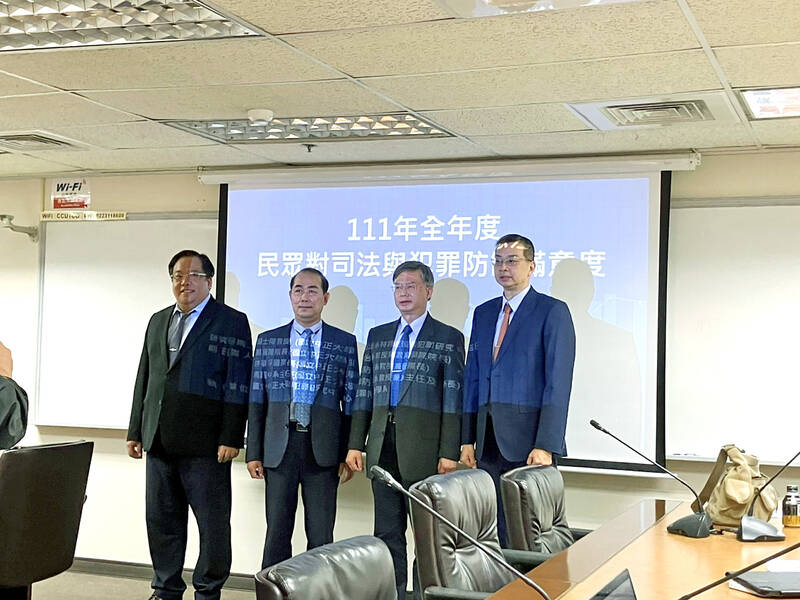More than 73 percent of people approved of law enforcement efforts to safeguard public security, a survey released on Monday by the Crime Research Center at National Chung Cheng University (CCU) showed.
A high 83.1 percent of respondents also gave their stamp of approval to “public safety conditions around their residence and local neighborhoods,” the survey showed.
However, 54.3 percent of respondents said they were not satisfied with government efforts “to strengthen the social safety net,” and only 32.8 percent indicated satisfaction when asked if “judges make fair and rightful rulings on criminal cases.”

Photo: Wang Kuan-jen, Taipei Times
Just a little over the majority, or 55.3 percent, said they were satisfied with the “government’s heavy crackdown on drugs,” while 53.3 percent said they were dissatisfied with “government efforts to crack down on financial fraud and extortion,” researchers at the center said.
The survey showed that 83.6 percent of respondents opposed the decriminalization of cannabis use, while 90.5 percent agreed that people convicted of killing police officers should be sentenced to death, they said.
Ratings on the key indicators of public security dropped compared with a previous survey, although most people still endorsed police efforts to uphold safety in local communities, CCU criminology professor Cheng Jui-lung (鄭瑞隆) said.
“The social safety net is the main underlying structure for maintaining public security, which includes medical, health and public hygiene measures, and mental health and psychological well-being. Given this underlying structure, it is impossible to maintain public security by relying solely on law enforcement by police,” Cheng said.
“Maintaining peace and public safety cannot depend only on police officers combating criminal elements. It also needs the justice system, measures to promote medical health and mental well-being, uphold security in local neighborhoods, and cooperation by a law-abiding public,” he added.
The survey shows that the public wants a more proactive approach and stronger efforts by the government to combat serious crimes, said Ma Yao-chung (馬躍中), head of CCU’s criminology department, adding that “cross-ministerial collaboration is needed to build a more comprehensive social safety net.”
“Government ministries and agencies should coordinate and combine their resources, as well as introduce legislation, to combat fraud,” Ma said.
The government should also step up efforts to search and seize illegal drugs, and its public campaign against their use, he added.
In combating fraud, identity theft has become a major problem, Ma said, suggesting that stealing a person’s identity and setting up fake bank accounts should be defined as a separate offense and that corresponding punishments be meted out.
If imposing a steep fine as an administrative penalty has no deterrent effect, criminal prosecution could be the next step, he said.
One option would be to introduce legislation that would fine offenders NT$1 million (US$33,096) to discourage fraud rings and reduce the numbers of victims of bank fraud, he added.
Cheng said that while the public response to the question on judges’ ability to make fair rulings appeared to be low at 32.8 percent, it was an improvement from the 18 percent it garnered from a poll conducted 10 years earlier.
The survey was conducted from Jan. 13 to 16, with 30,000 telephone calls made, and 1,806 people completing the questionnaire. It had a margin of error of 2.2 percentage points.

Alain Robert, known as the "French Spider-Man," praised Alex Honnold as exceptionally well-prepared after the US climber completed a free solo ascent of Taipei 101 yesterday. Robert said Honnold's ascent of the 508m-tall skyscraper in just more than one-and-a-half hours without using safety ropes or equipment was a remarkable achievement. "This is my life," he said in an interview conducted in French, adding that he liked the feeling of being "on the edge of danger." The 63-year-old Frenchman climbed Taipei 101 using ropes in December 2004, taking about four hours to reach the top. On a one-to-10 scale of difficulty, Robert said Taipei 101

Nipah virus infection is to be officially listed as a category 5 notifiable infectious disease in Taiwan in March, while clinical treatment guidelines are being formulated, the Centers for Disease Control (CDC) said yesterday. With Nipah infections being reported in other countries and considering its relatively high fatality rate, the centers on Jan. 16 announced that it would be listed as a notifiable infectious disease to bolster the nation’s systematic early warning system and increase public awareness, the CDC said. Bangladesh reported four fatal cases last year in separate districts, with three linked to raw date palm sap consumption, CDC Epidemic Intelligence

Two Taiwanese prosecutors were questioned by Chinese security personnel at their hotel during a trip to China’s Henan Province this month, the Mainland Affairs Council (MAC) said yesterday. The officers had personal information on the prosecutors, including “when they were assigned to their posts, their work locations and job titles,” MAC Deputy Minister and spokesman Liang Wen-chieh (梁文傑) said. On top of asking about their agencies and positions, the officers also questioned the prosecutors about the Cross-Strait Joint Crime-Fighting and Judicial Mutual Assistance Agreement, a pact that serves as the framework for Taiwan-China cooperation on combating crime and providing judicial assistance, Liang

US climber Alex Honnold left Taiwan this morning a day after completing a free-solo ascent of Taipei 101, a feat that drew cheers from onlookers and gained widespread international attention. Honnold yesterday scaled the 101-story skyscraper without a rope or safety harness. The climb — the highest urban free-solo ascent ever attempted — took just more than 90 minutes and was streamed live on Netflix. It was covered by major international news outlets including CNN, the New York Times, the Guardian and the Wall Street Journal. As Honnold prepared to leave Taiwan today, he attracted a crowd when he and his wife, Sanni,